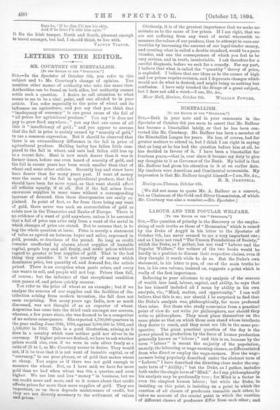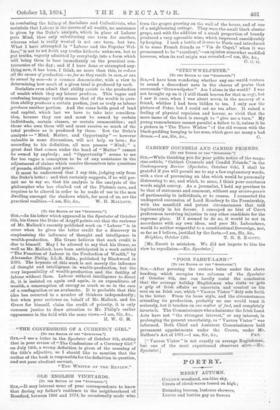LABOUR AND THE POPULAR WELFARE.
[TO THE EDITOR. or THE " SPECTATOR."]
SIR,—The question of priority in the discovery or the empha- sising of such truths as those of "Economics," which is raised' by the Duke of Argyll in his letter to the Spectator of October 6th, has never seemed to me a very important one ;. and as I have not read " The Unseen Foundations of Society," whilst the Duke, as I gather, has not read " Labour and the Popular Welfare," the writers of the two books would be- hardly in a position to discuss their respective claims, even if they thought it worth while to do so. But the Duke's own statement, in his letter to you, of one of the main truths he- has, in his own volume, insisted on, suggests a point which is really of the first importance.
Referring to your allusions to my analysis of the sources. of wealth into land, labour, capital, and ability, he says that he has himself included all I mean by ability in his own analysis, viz., "Mind, matter, and opportunity." I can well believe that this is so ; nor should I be surprised to find that the Duke's analysis was, philosophically, far more profound• than mine. But those who study economics from a practical point of view do not write for philosophers, nor should they write as philosophers. They must place themselves on the same plane as that on which those men stand whose intellects. they desire to reach, and they must see life in the same per- spective. The great practical question of the day is the power placed in production by the force of human production generally known as " labour ;" and this is so, because by the term " labour " is meant the majority of the population,. namely, the labouring or wage-earning classes, as differentiated from who direct or employ the wage-earners. Now the wage- earners being popularly described under the abstract term of "Labour," I have described the directing. class under the cog- nate term of " Ability ; " but the Duke, as I gather, includes both under the single term of "Mind." As I say, philosophically his analysis may be profoundly true ; for Mind is a factor in even the simplest human labour; but while the Duke, in insisting on this point, is insisting on a point in which the exertion of all classes of producers resemble each other, he takes no account of the crucial point in which the exertion of different classes of producers differ from each other; and in combating the fallacy of Socialists and Collectivists, who maintain that Labour is the source of all wealth, no assistance is given by the Duke's analysis, which in place of Labour puts Mind, thus only substituting one term for another, whereas what is really wanted is not one term, but two. What I have attempted in " Labour and the Popular Wel- fare," is not to set forth any truths hitherto unknown, but to put truths, vaguely admitted by everybody, into a form which will bring them to bear immediately on the practical con- troversies of the day ; and if I have done or attempted any- thing new, it has been, I think, no more than this, to reduce all the causes of production—so far as they reside in men, or can be owned by men—to a common denominator, with a view to determining how much of a given total is produced by each.
Socialists even admit that ability assists in the production of wealth which they say labour produces. This vague and confusing language really means that of the wealth in ques- tion ability produces a certain portion, just as truly as labour produces another portion. And the same holds good of land and capital, which last we have to take into considera- tion, because they can and must be owned by certain individuals, certain classes, or certain communities ; and those who own them will and must receive so much of the total produce as is produced by them. But the Duke's analysis " Mind, Matter, and Opportunity" — however valuable in some discussions, will not help us here ; for according to his definition, all men possess " Mind ; " a great deal that comes under the head of " Matter " cannot be owned by anybody ; and " Opportunity " seems to me far too vague a conception to be of any assistance in the adjustment of claims which resolve themselves into questions .of pounds, shillings, and pence.
It must be understood that I say this, judging only from the Duke's letter ; and that certainly suggests, if he will per- mit me to say so, that his analysis is the analysis of the philosopher who has climbed out of the Platonic cave, and requires to be altered in order to be made of use to the men -dwelling amongst the shadows which, for most of us, are the practical realities.—I am, Sir, &c., W. H. MALLOCK.



















































 Previous page
Previous page